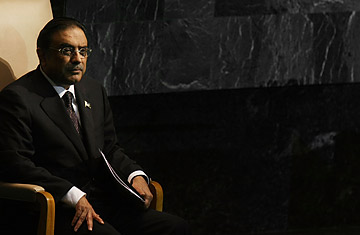
Pakistani President Asif Ali Zardari
The drums have fallen silent, the dancing in the streets has ended and Pakistan's stock exchange has rebounded, but Monday's political compromise — which ended a dangerous standoff — has not necessarily ensured stability. Monday's announcement of the reinstatement of Chief Justice Iftikhar Muhammad Chaudhry and 60 other judges sacked two years ago by then President Pervez Musharraf was a momentous victory for an opposition-backed protest movement. It also satisfied the concerns of Pakistan's military chiefs about avoiding a confrontation on the streets — while easing U.S. fears that partisan infighting would imperil Pakistan's battle against extremism. But the outcome of the standoff has dealt a body blow to President Asif Ali Zardari and his ruling Pakistan People's Party (PPP), potentially opening the way to further political turmoil.
Political support for Zardari and his government was flagging even before the showdown over the judges, which revealed cracks within the PPP as key party leaders either abandoned the Cabinet or attacked it from the sidelines before the President's embarrassing retreat. (See pictures of the victorious lawyers' protest.)
Monday's announcement by Prime Minister Yousuf Raza Gilani that the judges would be reinstated was greeted with acclaim, though few bought his explanation that the PPP had always sought the return of Chaudhry. The PPP had backed the lawyers' movement to demand that Musharraf reinstate the judges fired in 2007. But once in power, Zardari backtracked, prompting accusations that he feared an independent judiciary might reinstate corruption charges against him, which were dropped as part of an amnesty proclaimed by Musharraf (the legality of which has been questioned).
Zardari's reluctance to reinstate the judges was evident just hours before Gilani's dawn address. At 10:50 p.m. on Sunday, a government official issued a statement accusing Chaudhry and other judges of having become "too political because of their association with the street protests to remain viable candidates for the higher judiciary." Three hours later, the same official issued a statement saying that Gilani's speech would "reinforce the government's commitment to reconciliation in accordance with the constitution and the spirit of democracy." Between the two e-mailed statements, Pakistan's army chief, General Ashfaq Kayani paid an hour-long visit to the presidential palace in Islamabad.
Events of the past week appear to have tested Kayani's reputed preference to remain outside of politics. The general has been concerned with winning political support for the military's faltering campaign against extremism. He has feared that a focus on the struggle would be undermined by the clash between Zardari and opposition leader and former Prime Minister Nawaz Sharif that began three weeks ago, when the Supreme Court barred Sharif and his brother Shahbaz from running for public office. Shahbaz Sharif headed the provincial government of Punjab, Pakistan's largest and wealthiest province, and Zardari took the opportunity to oust him and transfer power to the governor, one of his allies. U.S. and British diplomats urged both sides to find a compromise in the interest of focusing on the fight against extremism — an intervention welcomed by many Pakistanis, who harbor bitter memories of the Bush Administration's support for Musharraf when he was faced with pro-democracy protests. Kayani's Sunday-night visit is viewed by analysts in Pakistan as the decisive moment in settling the standoff over the judges, and a reminder of the army's enduring clout. "It is a sign of political immaturity that the political parties could not resolve the matter among themselves," says Talat Masood, a retired general turned military and political analyst.
Nawaz Sharif has hailed his opponent's retreat on the judges as a victory, emboldening Pakistan's right wing and religious forces, which had backed the lawyers' protest movement. Unlike Zardari's government, which is dominated by secular parties who back the U.S.-led effort against militancy, some of the parties aligned with Sharif have sought to capitalize on the anti-American sentiment that built up during the Musharraf years by resisting cooperation with Washington. Sharif himself has been accused of ambivalence on the U.S.'s war on terrorism, and the political shift reflected in Zardari's defeat may make it more difficult to build the national consensus against extremism as desired by the U.S. and Kayani. Still, reports suggest that Sharif has exhibited rare signs of flexibility, responding favorably to a phone call from Secretary of State Hillary Clinton urging compromise.
Despite Monday's retreat by the government, the political bad blood of recent weeks won't wash away easily. The question of who will rule Punjab remains unresolved, and a potential source of a new clash, despite Gilani's announcement that the government will file a petition urging the court to revisit its ruling on the Sharif brothers.
And while the major parties have been locked in a poisonous confrontation over Punjab, some powerful politicians in smaller provinces are complaining that Punjab, traditionally Pakistan's seat of power and privilege, is holding the country hostage. Much of the lawyers' movement and Sharif's own support base comprises urban Punjabis, but with the North-West Frontier Province and Baluchistan already plagued by instability, tension between Islamabad and Punjab could make governing Pakistan even more difficult.
Whether the respite from last week's crisis proves to be temporary or lasting will depend largely on the behavior of Sharif and Zardari. Shortly before setting out on the march to Islamabad, Sharif had said that if the government yielded on the judges, he'd give it the political breathing space it needs to survive a full term. But moments after he won that battle, Sharif hailed the government's retreat over the judges as "the first step" in a "revolution." Aides to the opposition leader say he meant that an independent judiciary, once restored, would roll back many of the wide-ranging powers accumulated for the presidency by Musharraf. If so, that would be in line with the PPP's own campaign promises, but once again, it's not clear that Zardari will easily relinquish control.
